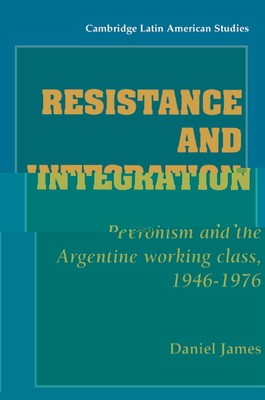
- We will send in 10–14 business days.
- Author: Daniel James
- Publisher: Cambridge University Press
- ISBN-10: 0521466822
- ISBN-13: 9780521466820
- Format: 15.2 x 22.8 x 1.7 cm, minkšti viršeliai
- Language: English
- SAVE -10% with code: EXTRA
Reviews
Description
This book analyzes the relationship between Peronism and the Argentine working class from the foundation of the Peronist movement in the mid 1940s to the overthrow of Peron's widow in 1976. It presents an account of such crucial issues as the role of the Peronist union bureaucracy and the impact of the Peronist ideology on workers. Drawing on a variety of untapped sources, Daniel James confronts many of the dominant myths that have surrounded the movement. He argues that its role in containing working-class militancy cannot be explained solely in terms of manipulation, corruption, or union gangsterism.
EXTRA 10 % discount with code: EXTRA
The promotion ends in 23d.06:20:09
The discount code is valid when purchasing from 10 €. Discounts do not stack.
- Author: Daniel James
- Publisher: Cambridge University Press
- ISBN-10: 0521466822
- ISBN-13: 9780521466820
- Format: 15.2 x 22.8 x 1.7 cm, minkšti viršeliai
- Language: English English
This book analyzes the relationship between Peronism and the Argentine working class from the foundation of the Peronist movement in the mid 1940s to the overthrow of Peron's widow in 1976. It presents an account of such crucial issues as the role of the Peronist union bureaucracy and the impact of the Peronist ideology on workers. Drawing on a variety of untapped sources, Daniel James confronts many of the dominant myths that have surrounded the movement. He argues that its role in containing working-class militancy cannot be explained solely in terms of manipulation, corruption, or union gangsterism.


Reviews